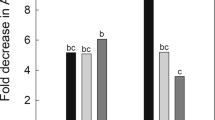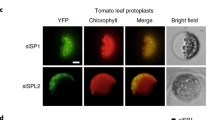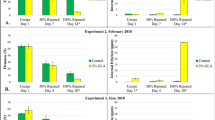Abstract
EVOLUTION of ethylene by ripening fruit and acceleration of ripening by application of the gas to green fruit has been of interest for many years. However, little more than the gross aspects of these phenomena has been known until recently, when Burg and Thimann1 used gas chromatography to study the evolution of ethylene by apple-tissue slices. In our laboratories we have been able to observe the production of ethylene by a mitochondrial fraction from tomatoes.
This is a preview of subscription content, access via your institution
Access options
Subscribe to this journal
Receive 51 print issues and online access
$199.00 per year
only $3.90 per issue
Buy this article
- Purchase on Springer Link
- Instant access to full article PDF
Prices may be subject to local taxes which are calculated during checkout
Similar content being viewed by others
References
Burg, S. P., and Thimann, K. V., Proc. U.S. Nat. Acad. Sci., 45, 335 (1959).
Spencer, M. S., Can. J. Biochem. Physiol., 36, 596 (1958).
Pratt, H. K., Plant Physiol., 26, 304 (1951).
Spencer, M. S., Can. J. Biochem. Physiol., 36, 1261 (1956).
Author information
Authors and Affiliations
Rights and permissions
About this article
Cite this article
SPENCER, M. Production of Ethylene by Mitochondria from Tomatoes. Nature 184, 1231–1232 (1959). https://doi.org/10.1038/1841231a0
Issue Date:
DOI: https://doi.org/10.1038/1841231a0
This article is cited by
-
Evolution of Ethylene by Sub-Cellular Particles from Tomatoes as Influenced by Components of the System
Nature (1963)
-
Ethylene Production by Subcellular Particles from Rat Liver, Rat Intestinal Mucosa and Penicillium Digitatum
Nature (1963)
-
Ethylene Production by Sub-Cellular Particles from Tomatoes
Nature (1962)
-
Problems of Ethylene Metabolism
Nature (1962)
-
Ethylene Evolution and Sub-Cellular Particles
Nature (1961)
Comments
By submitting a comment you agree to abide by our Terms and Community Guidelines. If you find something abusive or that does not comply with our terms or guidelines please flag it as inappropriate.



